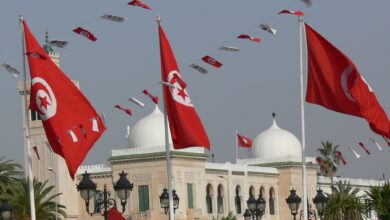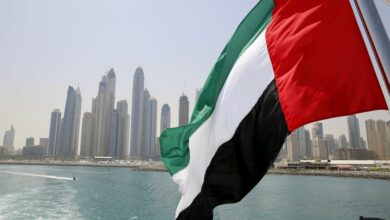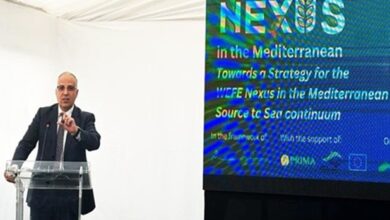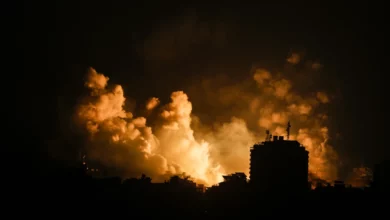The Genina Theatre is set into the wall of the Azhar Park like an ancient Greek amphitheatre. The steep slope into which the seats are set assures excellent acoustics, while the seclusion gives a sense of intimacy to the spectators. Funded by al-Mawred al-Thaqafi, this stage is the platform for his Ramadan music program Hay.
On this remarkable stage, dressed in bright red and barefooted, Tunisian singer Emel Mathlouthy and her three piece band performed. Mathlouthy moved to France three years ago where she has been polishing her considerable musical skills. There she put her band together and they have now been playing together for a year. She composes all her own songs.
When asked to define the genre to which her music belongs, Mathlouthy has to think for a while before she says, “I would say it’s a fusion of classical, rock, and Arabic singing”. In fact her pieces are complex, seldom limited to just one of these styles, as they shift effortlessly between one and another.
In one piece she started to sing unaccompanied, very softly, to be joined a moment later in a duet with the violin picking up the same tune. After a few moments of this simple exchange, bass and drums jump in. The piece immediately takes on a more full bodied aspect as the listener is flung from the soft duo of violin and voice, to a full and rich sound. Still the violin can be heard gently surfing on the escalating beat of the drum, which gets faster and faster until the climax when all is literally ripped back to silence.
Mathlouthy's musical range covers far more than the three genres she mentioned. In some tunes I picked up hints of country music, the drummer played African bongos a couple of times while the violin melodies sometimes reminded me of traditional gypsy songs.
One song in particular borrowed heavily from gypsy tradition as well as giving back to it. Mathlouthy added Arabic lyrics to the tune. She sang about the Palestinian struggle for land and freedom and the similarities in their situation to that of the gypsies. Both peoples do not have a land they can call truly call their own, both have been displaced by conflict, and both show the same resilience in the face of hardship.
Another song dealt with the issue of censorship in the singer’s home country, Tunisia. Inspired by the struggle for freedom and human rights, she dedicated this song to the many who have been imprisoned, and to the women left to wait for their sons and husbands to be released from jail.
Her singing ability is highlighted by her capacity to shift her vocal production from softly spoken words to audacious thrills in seconds. She also directs her band on stage, often signaling the musicians and conducting them through the performance.
Mathlouthy’s band is excellent: the violin player brilliantly coaxed oriental music from his instrument and played classical solos with equal skill; the bass player performed his job to perfection, providing the soul of every tune; while the drummer provided both a stability and at the same time a springboard for changing tunes. Amongst all this Mathlouthy’s voice and stage persona stood out charming the listeners to raptured contemplation.




